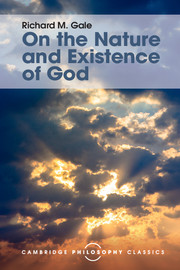8 - Religious-experience arguments
from Theological arguments
Published online by Cambridge University Press: 05 July 2016
Summary
Throughout history, in almost every society, persons have claimed to experience God or some ultimate reality in the same sort of immediate way that they experience physical objects through their senses. Their experiences have been quite diverse, running the gamut from extrovertive and introvertive mystical experiences of some underlying unity into which the experient is totally or partially incorporated to numinous experiences and direct experiences of God's presence as a very powerful, loving, nonhuman person who shows concern for the well-being of the experient. Different descriptions are given of the apparent object of their experiences – God, one's personal purusha, Brahman, the eternal one, the undifferentiated unity, and the like. In spite of these different characterizations, the subjects agree in taking the object of their experience to be the ultimate reality, the really real, and, most important, are convinced that man's greatest possible good consists in achieving a direct, experiential contact or union with this reality. For these reasons, I shall call all these experiences “religious experiences,” even though they are not taken to be such by everyone who has them.
I shall duck the thorny issue of whether there is a common phenomenological content to all or most of these experiences, at least the unitive ones, that supposedly gets interpreted differently by mystics in diverse cultures, as well as the larger problem of whether the phenomenological–interpretative and observation–theoretical language distinctions are viable. While I am in basic agreement with the twentieth-century “mystical ecumenicalists” – Underhill, Otto, Stace, Suzuki, Merton, and N. Smart – who accept these dualisms and find a common phenomenological content, it will not be necessary for me to defend their views against their contemporary critics, such as R. C. Zaehner and Steven Katz. I will assume that these distinctions are viable relative to our epistemic circumstances – the manner in which we experience the world and process information. Our perception of something as a chair involves a minimal amount of theoretical interpretation, if any, but our perception of a track in a Wilson cloud chamber as a movement of an electron involves a highly theoretically based inference. Similarly, our experience of an undifferentiated unity or a personal, loving presence is relatively noninferential as contrasted with our perception of an evil as a test set for us by God or of a sunset as an expression of God's love.
- Type
- Chapter
- Information
- On the Nature and Existence of God , pp. 244 - 294Publisher: Cambridge University PressPrint publication year: 2016

